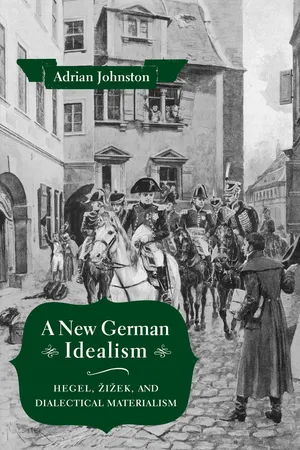
A New German Idealism
Hegel, Žižek, and Dialectical Materialism
- English
- ePUB (mobile friendly)
- Available on iOS & Android
About this book
In 2012, philosopher and public intellectual Slavoj Žižek published what arguably is his magnum opus, the one-thousand-page tome Less Than Nothing: Hegel and the Shadow of Dialectical Materialism. A sizable sequel appeared in 2014, Absolute Recoil: Towards a New Foundation of Dialectical Materialism. In these two books, Žižek returns to the German idealist G. W. F. Hegel in order to forge a new materialism for the twenty-first century. Žižek's reinvention of Hegelian dialectics explores perennial and contemporary concerns: humanity's relations with nature, the place of human freedom, the limits of rationality, the roles of spirituality and religion, and the prospects for radical sociopolitical change.
In A New German Idealism, Adrian Johnston offers a first-of-its-kind sustained critical response to Less Than Nothing and Absolute Recoil. Johnston, a leading authority on and interlocutor of Žižek, assesses the recent return to Hegel against the backdrop of Kantian and post-Kantian German idealism. He also presents alternate reconstructions of Hegel's positions that differ in important respects from Žižek's version of dialectical materialism. In particular, Johnston criticizes Žižek's deviations from the secular naturalism and Enlightenment optimism of his chosen sources of inspiration: not only Hegel, but Karl Marx and Sigmund Freud too. In response, Johnston develops what he calls transcendental materialism, an antireductive and leftist materialism capable of preserving and advancing the core legacies of the Hegelian, Marxian, and Freudian traditions central to Žižek.
Frequently asked questions
- Essential is ideal for learners and professionals who enjoy exploring a wide range of subjects. Access the Essential Library with 800,000+ trusted titles and best-sellers across business, personal growth, and the humanities. Includes unlimited reading time and Standard Read Aloud voice.
- Complete: Perfect for advanced learners and researchers needing full, unrestricted access. Unlock 1.4M+ books across hundreds of subjects, including academic and specialized titles. The Complete Plan also includes advanced features like Premium Read Aloud and Research Assistant.
Please note we cannot support devices running on iOS 13 and Android 7 or earlier. Learn more about using the app.
Information
Table of contents
- Cover
- Title Page
- Copyright
- Dedication
- Epigraphs
- Contents
- Preface: Drawing Lines—Žižek’s Speculative Dialectics
- Acknowledgments
- Introduction: Sublating Absolute Idealism—Žižekian Materialist Reversals
- One: “Freedom or System? Yes, Please!”: Spinozisms of Freedom and the Post-Kantian Aftermath Then and Now
- Two: Where to Start?: Deflating Hegel’s Deflators
- Three: Contingency, Pure Contingency—Without Any Further Determination: Hegelian Modalities
- Four: Materialism Sans Materialism: Žižekian Substance Deprived of Its Substance
- Five: Bartleby by Nature: German Idealism, Biology, and Žižek’s Compatibilism
- Conclusion: Driven On—the (Meta)Dialectics of Drive and Desire
- Notes
- Bibliography
- Index